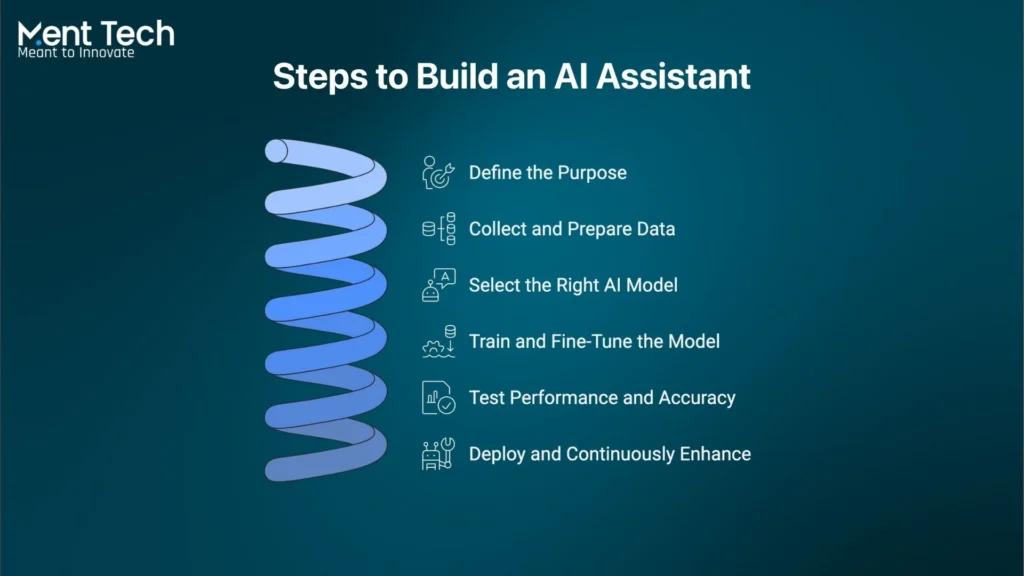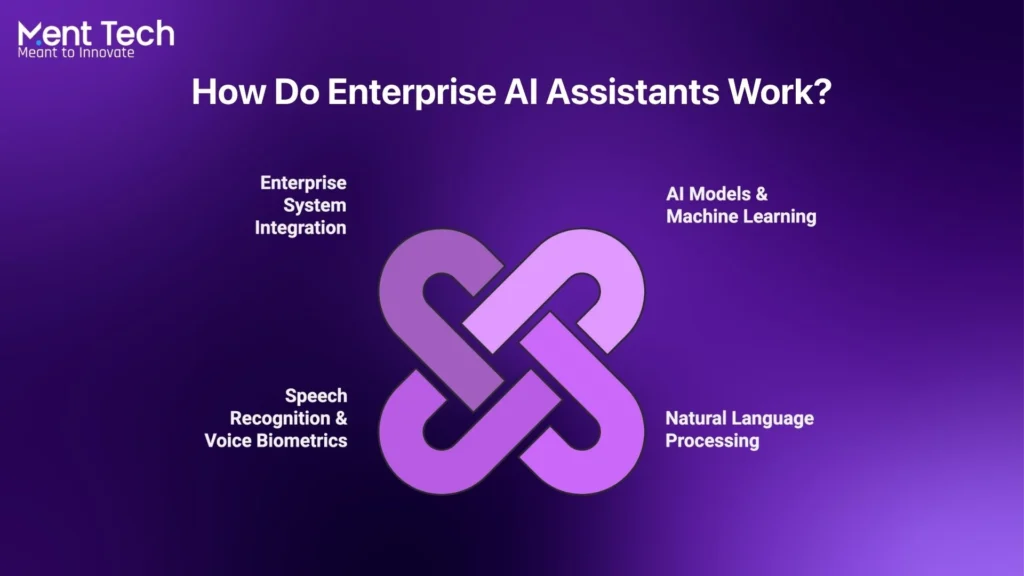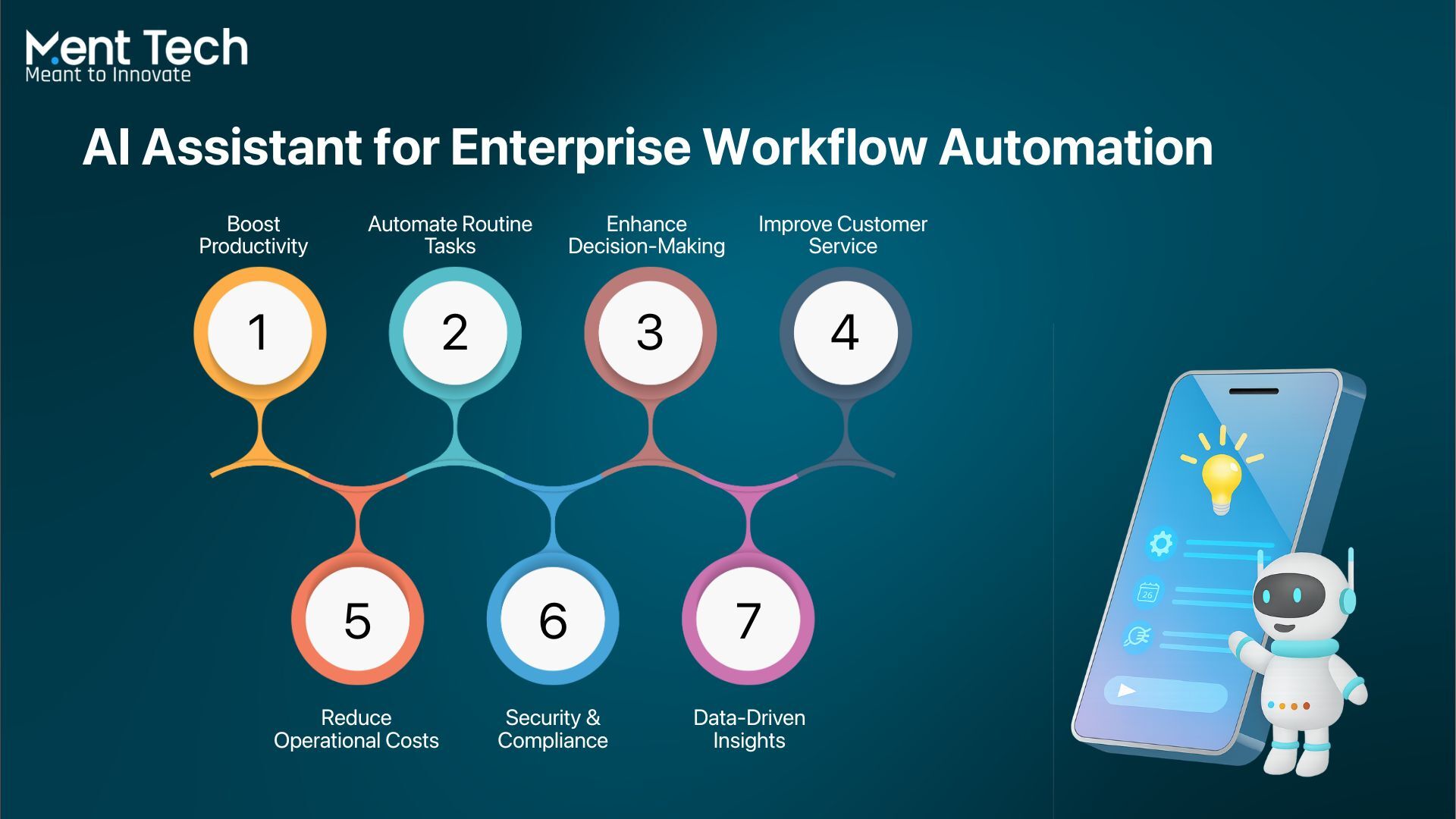Struggling to keep up with endless emails, customer queries, and repetitive tasks. Many businesses today face the challenge of doing more with less time, rising costs, and growing competition. AI assistants for business are helping companies streamline operations, improve productivity, and give teams the space to focus on high-value work that drives growth and innovation.
Recent surveys show that 78% of organizations now use AI in at least one business function, reflecting a growing trend of adopting intelligent tools that assist with customer service, internal workflows, and decision-making. These assistants not only handle routine tasks but also provide real-time insights, helping teams work smarter and faster in a competitive business environment.
This blog will guide you through the evolving role of AI assistants in modern enterprises, showing how they’re enhancing collaboration, improving productivity, and enabling organizations to move with greater speed and clarity. As companies deal with increasing complexity, AI is emerging as a key driver of smarter, future-ready operations.
What is an AI Assistant for Business?
An AI assistant for business is a software tool that uses artificial intelligence to help employees complete tasks more efficiently. It can understand natural language, answer questions, provide information, and perform routine tasks like scheduling meetings, sending reminders, or managing emails. By handling repetitive work, these assistants free up time for employees to focus on more important responsibilities.
Enterprise AI assistants can also integrate with other business tools, such as CRM systems, calendars, or IT platforms, to streamline workflows. Over time, they learn from interactions to offer more accurate suggestions and personalized support. Many businesses utilize them to enhance productivity, inform decision-making, and streamline daily operations.
The market for enterprise AI assistants is expected to reach USD 46.5 billion by 2032, driven by growing business adoption, advances in natural language processing, and deeper integration into workflows.
Popular Types of AI Assistants Used by Enterprises
AI assistants come in different forms, each designed to help businesses and individuals automate tasks, improve productivity, and enhance user interactions. From simple chatbots to advanced virtual assistants, each type serves specific needs across industries and workflows.
1. AI Chatbots
AI chatbots interact with users through text on websites, messaging apps, and social media to streamline support and lead generation. They are ideal for handling repetitive queries while maintaining customer engagement.
- Provide 24/7 customer support and answer FAQs
- Generate and qualify leads through automated conversations
- Integrate with messaging apps and business platforms
Examples: ChatGPT, LiveAgent AI Chatbot
2. Conversational Agents
Conversational agents offer human-like voice or text interactions, providing a more natural communication experience. They can execute tasks and respond contextually, improving engagement and workflow efficiency.
- Understand user intent and provide context-aware responses
- Execute tasks like reminders, scheduling, and information lookup
- Support voice and text interaction across devices
Examples: Amazon Alexa, Google Assistant
3. AI Virtual Assistants
AI virtual assistants handle complex workflows across multiple platforms, helping teams manage schedules, emails, and tasks efficiently. They also provide personalized suggestions by analyzing previous interactions.
- Schedule meetings, manage emails, and organize workflows
- Analyze interactions to provide personalized suggestions
- Integrate with enterprise software like Microsoft Office, Google Workspace, or CRM platforms
Examples: IBM Watson Assistant, Google Bard
4. Domain-Specific Assistants
These assistants are tailored for specific industries, delivering specialized insights and optimized workflows. They automate industry-focused tasks to increase efficiency and accuracy in business processes.
- Deliver insights and guidance specific to an industry
- Automate workflows for industry-specific tasks
- Offer recommendations based on domain data
Examples: Cleo (Finance)
5. AI Personal Finance Assistants
AI personal finance assistants help users manage budgets, track spending, and monitor financial health. They provide actionable insights and automate routine finance-related tasks for better money management.
- Track spending, manage budgets, and provide financial insights
- Automate bill payments and reminders
- Offer investment suggestions and monitor financial health
Examples: Ment Tech AI Personal Finance Assistants
6. AI Healthcare Assistants
AI healthcare assistants support patients and medical professionals by monitoring health data and providing timely guidance. They help with symptom checks, appointments, and medication management to enhance care delivery.
- Check symptoms and provide potential diagnoses
- Schedule appointments and manage medication reminders
- Monitor health data from wearables and provide insights
Examples: Ment Tech AI Healthcare Assistants, Ada Health
How to Create an AI Assistant for Your Business?

Building a smart AI assistant starts with defining its purpose and preparing the right data. Through End-to-End AI Deployment, you can launch a fully integrated solution that boosts efficiency and supports business growth.
1. Define the Purpose
Clearly define whether the assistant will handle customer support, productivity, or voice commands. This guides the choice of AI models, APIs, and frameworks.
2. Collect and Prepare Data
Gather structured text, voice, and user interaction data. Cleaning and organizing the data ensures the AI assistant accurately understands user intent and responds effectively.
3. Select the Right AI Model
Choose between pre-trained, custom, or hybrid models based on your project needs. The model choice impacts responsiveness, accuracy, and user experience.
4. Train and Fine-Tune the Model
Feed data into the model and refine it using supervised, unsupervised, or reinforcement learning. Fine-tuning improves context understanding, tone, and handling of complex user queries.
5. Test Performance and Accuracy
Evaluate response quality, speed, and user satisfaction. Testing with real-world scenarios helps identify gaps and improve performance before deployment.
6. Deploy and Continuously Enhance
Launch the assistant and monitor performance. Regular updates and integrations ensure it stays adaptive, efficient, and aligned with evolving business requirements.
Difference Between AI Agents and AI Assistants
AI assistants and AI agents are often mentioned together, but they play very different roles inside an enterprise. The core difference lies in how independently they operate, how they make decisions, and the complexity of tasks they can handle.
| Aspect | AI Assistants for Business | AI Agents in Business |
| Purpose | Support users with specific tasks like answering queries, drafting responses, or scheduling. | Execute multi-step workflows autonomously to achieve business goals. |
| User Interaction | Respond when prompted and require direct instructions. | Take initiative with minimal input and act based on context. |
| Task Complexity | Handle simple, well-defined tasks within a limited scope. | Manage complex, cross-system workflows end-to-end. |
| Decision-Making | Follow predefined rules or guided logic. | Evaluate situations, adjust strategies, and learn from outcomes. |
| Example Use Case | Managing emails, generating documents, answering FAQs. | Processing orders, resolving tickets autonomously, optimizing logistics. |
| Autonomy Level | Reactive works only when asked. | Proactive identifies needs and takes action independently. |
| Integration Depth | Connects to a few tools to assist users. | Deeply integrated across CRMs, ERPs, support systems, and databases. |
How Do Enterprise AI Assistants Work?

Enterprise AI assistants interpret natural language, analyze user intent, and generate accurate responses instantly. With NLP, machine learning, and system integrations, they automate tasks and streamline enterprise workflows.
1. AI Models & Machine Learning
AI assistants use advanced machine learning and enterprise-grade models to understand intent, learn patterns, and improve accuracy over time. With support from a professional Machine Learning Services team, these models can be customized for industry-specific workflows and rules. This continual learning enables smarter automation and more reliable enterprise decision-making.
2. Natural Language Processing (NLP)
NLP enables assistants to interpret unstructured human language and turn complex queries into precise actions. As an NLP development company, we ensure the system understands context, tone, and phrasing across diverse communication styles. This creates natural, fluent conversations that enhance accuracy and improve overall user experience.
3. Speech Recognition & Voice Biometrics
Speech recognition transforms real-time voice input into structured data that the AI can understand, enabling smooth enterprise interactions. With integrated voice biometrics, the system can securely authenticate users during critical workflows. These capabilities make voice-driven tools ideal for any voice/chat agent for an enterprise needing fast, hands-free, and secure communication.
4. Enterprise System Integration
AI assistants connect seamlessly with CRMs, ERPs, ticketing tools, and knowledge systems to deliver contextual insights instantly. This deep integration allows them to automate tasks, trigger workflows, and support both voice and chat interactions across the enterprise. As a result, businesses gain a unified AI layer that powers end-to-end automation, not just conversation.
Key Benefits of Adopting an AI Assistant for Your Business
Enterprise AI assistants streamline workflows, automate tasks, and enhance productivity across teams. Leveraging Adaptive AI Development, businesses can build smarter tools that deliver actionable insights and improve overall efficiency.
1. Boost Productivity
Enterprise AI assistants manage routine queries, scheduling, and information efficiently. Employees can focus on strategic tasks, improving overall workflow.
2. Automate Routine Tasks
AI assistants automate follow-up emails, data entry, and simple processes. This reduces effort and frees time for higher-value work.
3. Enhance Decision-Making
AI assistants analyze large datasets and provide actionable insights in real time. Businesses can make smarter, data-driven decisions, identify trends, and anticipate risks more effectively.
4. Improve Customer Service
AI chatbots and voice assistants offer 24/7 support with instant, consistent responses. This improves customer satisfaction, reduces wait times, and builds stronger engagement and loyalty.
5. Reduce Operational Costs
By automating workflows and minimizing errors, AI assistants help enterprises optimize resources and reduce overhead. Companies can scale operations efficiently while controlling expenses.
6. Ensure Security & Compliance
AI assistants monitor processes, detect anomalies, and safeguard sensitive data. They help maintain compliance, prevent fraud, and enhance overall enterprise security, including AI for KYC workflows.
7. Data-Driven Insights
AI assistants track communications and project progress. They provide actionable reports to improve efficiency and support informed decision-making.

Practical Applications of AI Assistants Across Diverse Industries
AI assistants help enterprises streamline operations, boost productivity, and support smarter decision-making. They automate tasks and deliver real-time, personalized solutions across departments.
• Finance and Banking
AI assistants simplify banking processes by handling customer queries, managing transactions, detecting fraud, and offering personalized financial guidance. They help reduce errors and improve overall efficiency.
Real-World Example: JPMorgan Chase uses AI-powered virtual assistants to handle routine client queries and automate transaction approvals, speeding up services and enhancing customer satisfaction.
• Healthcare
AI assistants support doctors and staff by scheduling appointments, monitoring patient vitals, sending medication reminders, and assisting in preliminary diagnostics. They improve efficiency and reduce human error in healthcare operations.
Real-World Example: Fortis Healthcare in India leverages AI assistants to streamline patient intake, track vitals, and provide actionable insights to doctors for faster, accurate treatment plans.
• Education
AI assistants provide personalized learning experiences, help instructors manage classrooms, and automate administrative tasks. They make education more interactive, adaptive, and efficient.
Real-World Example: BYJU’S incorporates AI assistants to tailor lessons and quizzes based on student progress, keeping learners engaged and improving outcomes through adaptive feedback.
• Retail and E-commerce
AI assistants personalize shopping experiences, manage inventory, track orders, and automate customer support. They enhance customer engagement while streamlining operations.
Real-World Example: Zara uses AI assistants to analyze online shopping behavior, optimize stock allocation, and provide personalized product recommendations, improving sales and user experience.
• Media & Entertainment
AI assistants help content creators automate video editing, manage social media, generate scripts, and analyze audience engagement. They save time, boost creativity, and support tailored content delivery.
Real-World Example: Netflix uses AI assistants to track viewer behavior and recommend personalized shows and movies, increasing engagement and watch time.
Conclusion
AI assistants are changing the way businesses operate, making it easier to automate repetitive tasks, boost productivity, and deliver personalized experiences. Companies can handle customer queries, streamline workflows, and make smarter decisions faster than ever before.
Ment Tech, a leading AI Development company, delivers custom AI assistant solutions for enterprises. From NLP development to voice/chat agent integration and full-scale automation, we create practical, scalable AI tools tailored to business needs.
Businesses leveraging AI assistants gain a competitive advantage by improving efficiency, reducing errors, and providing consistent customer experiences. Hire AI developers from Ment Tech to design, deploy, and optimize intelligent AI solutions that transform your operations and drive growth.
FAQs
An AI business assistant uses machine learning and natural language processing to understand commands, complete tasks, and provide real-time insights. As a top AI consulting solution, it helps enterprises optimize operations, making it a key part of Enterprise AI assistants.
Most AI assistants for business are intuitive and user-friendly. Minimal training is needed, and onboarding features guide employees to effectively leverage the role of AI assistants at work and maximize productivity.
AI assistants for enterprise analyze customer data, segment audiences, personalize campaigns, and automate outreach. Leveraging insights from LLM development enables businesses to design smarter, data-driven strategies, highlighting practical use cases for AI assistants across departments.
AI assistants use enterprise-grade encryption, strict access controls, and comply with regulations like GDPR or HIPAA. Continuous monitoring ensures sensitive business and customer data remains protected.
Absolutely. AI assistants for work and AI assistants for business integrate seamlessly with CRM, ERP, ITSM, and other enterprise systems, streamlining workflows and enabling efficient Enterprise AI Integration across all business functions.
Implementation of an AI assistant for an enterprise typically ranges from a few days to weeks, depending on system complexity and integrations. Ongoing support ensures the AI assistant for work continues to deliver value and enhances enterprise efficiency.


